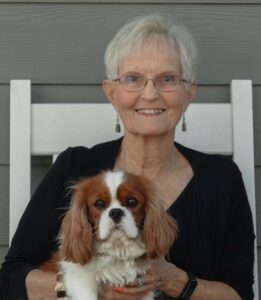By Jane Kirkpatrick
My first novel was sold before I wrote it. Somehow, I convinced a publisher that I had this great story to tell. That’s the good news. The bad news is that I didn’t know if I could actually write
that story well enough to get published. My 41st novel comes out this May and it too was written carrying that unknown – is this good enough to be published?
One of the gifts of having a publisher behind me is that there is a deadline. (The advance is helpful too) but it’s really that date by which I have to turn the manuscript it that matters. It keeps
me from wallowing in self-pity about how terrible what I’ve written is, or discounting that my writing is worthy of my time and energy.
Having a deadline tells me that there are people counting on me. The publisher has made a place in their calendar for my manuscript and while I might give myself excuses not to write, it’s
proved harder for me to disappoint someone else.
They are also a team of people who wants me to succeed so when I feel particularly anxious about my work, I can remind myself that I’m not alone in the telling. Frankly, it makes taking
editing easier too. I can let go of any insistence about a word choice or the flow of the story knowing that the team brings experience and wisdom beyond my own. It also makes me think
clearly about what really matters: that back cover copy doesn’t really reflect what I hope the story is about so I can work to reshape it. The cover model? Not my idea but the more I look at
the draft, like the team, I think it’s going to work.
So what about writers without that publisher commitment? Here are some ways to create the imperative that a deadline offers even if you don’t have a contract.
1. When I wrote non-fiction pieces for magazines, I had no assurance of publication. At the suggestion of a fellow writer, when I finished a piece, I sought markets and made a list of
the top 10. I noted the date when I sent it to the top market and when it came back – rejected – I read it once and within 24 hours, sent it to the next magazine or newspaper on
the list. It was an artificial deadline, that 24 hours, but it gave me a next step which is important in writing. I never reached the 10th market before it sold. I don’t think this was
because I was a great writer but more because I kept the piece out there for a publisher to consider. Making the list of markets when I felt good about the piece was also important
because that’s when I was most hopeful and resilient, able to deal with the rejection.
2. When I wrote the novel proposals, I made artificial deadlines. I set my alarm for 4:00am with the commitment (a deadline) to be at the computer by 5:00am. I didn’t have to write
a number of words. I just had to “show up.” I continued that practice after I signed a contract. Later I found a quote from Goethe, the 19th Century lyrical poet that said that
what people don’t realize is that once you “make a commitment to something, Providence moves. And things begin to happen that you might otherwise couldn’t imagine.” Each
book I’ve written has a moment when I felt Providence move, when I knew I wasn’t telling the story by myself which kept me getting up at 4:00AM.
3. Consider forming a prayer team. I’d had several novels published when one day at church a woman who was visiting but who had read my books asked if I had a prayer team. “I
don’t.” She smiled and said, “You should.” I took her as an emissary of God and set about prayerfully forming a group of faithful friends, other writers, and readers. I know I have
many people who pray for me and my writing, but this team is a group I can bring my anxieties to, my fears about my writing, and my struggles in other life areas as well. They
may offer ideas for a book I’m working on, but in most instances, they are prayer warriors whom I can trust to tell me what they think. They are seven women from all over the
country and Canada who have been gifts of “deadlines” helping me keep going when I faltered.
Creating the benefits of a deadline is within a writer’s control. Doing so is a gift we give ourselves.
 Jane Kirkpatrick is the award-winning and best-selling author of 41 books; the latest landing May 20th titled Across the Crying Sands. Her stories are based on the lives of actual historical women with themes of faith, courage, family and hope. She lives parttime in Oregon and California with her husband of 49 years spoiling Rupert, their Cavalier King Charles Spaniel. Sign up for her Story Sparks newsletter at jkbooks.com.
Jane Kirkpatrick is the award-winning and best-selling author of 41 books; the latest landing May 20th titled Across the Crying Sands. Her stories are based on the lives of actual historical women with themes of faith, courage, family and hope. She lives parttime in Oregon and California with her husband of 49 years spoiling Rupert, their Cavalier King Charles Spaniel. Sign up for her Story Sparks newsletter at jkbooks.com.

Comments 3
Great wisdom in your words. Thank you. 🙂
A historical pioneer story set in the Pacific Northwest … Across the Crying Sands sounds like a great read!
A great article and reminder of the importance of those who stand with us and behind us, and the power of prayer in our writing efforts and our lives. Thanks for sharing that.